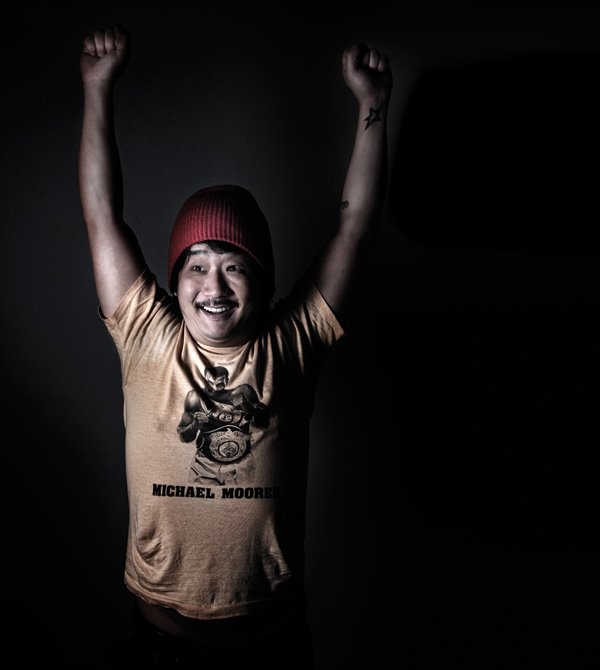Bobby Lee has led a successful comedy career with multiple film and TV roles, but his first love remains stand-up.
by CARL KOZLOWSKI
Growing up in San Diego as the son of Korean immigrants, Bobby Lee was expected to take over the family business. His parents owned a fivestore chain of clothing stores known as Fashion Gal, and while he appreciated the comfortable life their hard work afforded, he felt certain that working for them would eventually kill him.
“The stores catered to big ethnic women, like an ethnic Lane Bryant,” he recalls, a mix of anguish and laughter still mingled in his voice 20 years later.
“Just being trapped inside all day and having to deal with that. Stand-up comedy saved my life.”
Indeed, Lee found salvation in developing his own fearlessly energetic and brash form of comedy at the Comedy Store in La Jolla, about 12 miles north of downtown San Diego. Though he calls stand-up his bread and butter—he just played shows in Nashville, Tennessee, and Hasbrouck Heights, New Jersey, last month—he’s also enjoyed two decades of success on the small and big screen, including The Tonight Show appearances, roles in movies like The Dictator, Pineapple Express, A Very Harold & Kumar 3D Christmas and The Wedding Palace, and a long-running stint on Fox’s late and lamented Mad TV. The 41-year-old sat down to talk about life as a comic—the good, the bad and the ugly.
What do you love most about stand-up? Your stage career seems to be the hub of it all.
Bobby Lee: It wasn’t for a while, like when I was on Mad TV, I didn’t do it that much. But after Mad, stand-up is the only thing you can rely on. [It’s] the one thing I have complete control over and can dictate how I present myself and my jokes. It’s my bread and butter, and it saved my life, basically.
Your folks were Korean immigrants in the clothing business.
They owned a clothing store called Fashion Gal that provided clothing for big ethnic women. My dad wanted me to take over the business, five of those stores. I said no way and got out at 23.
So how did you get into stand-up, and why is it so important to you?
I did stand-up before anything, in the early ’90s, and then in 2000 I did The Tonight Show. I gave up stand-up a try during Mad TV, and thought I’d just be a TV star. But when it got canceled, everything dried up, and stand-up was the only thing available to me. I had development deals at NBC and Comedy Central, but they dried up. Even [when I was] in Harold and Kumar 3 and The Dictator a couple years back, I still did stand-up. Acting is the cherry on top of the cake.
How do you come up with material?
I only had 10 minutes of material when I did The Tonight Show. I wasn’t prolific. Now as a stand-up, I feel closer to who I am, and confident of what I’m doing. The shows have been really good and a lot of fun. If you have a couple bad years in L.A. as just an actor, I don’t know how [you] survive. I have friends who were in sitcoms who have day jobs later.
But I can do stand-up all over, in great rooms. Film is dying, so all the film stars are doing TV, and TV stars are doing commercials. There’s not as much work, I don’t think. It’s hard to book a show. When you don’t have stand-up or other means to be creative, you have to get a day job eventually. I was able to do [stand-up on] the road due to the name I made on Mad TV. I test all the time to act in shows—I’m still in the game. But at the end of the day, I get to meet my fans everywhere on the road and do something I love that I wrote. Rarely can you improvise in a studio show or movie. I just feel happier and far more creative doing stand-up.
You write a lot of material about your family. You’ve said that, early on, they were not supportive until The Tonight Show. Do they watch now?
When I play Phoenix, where they live now, they come and see me. And they were on Mad TV a lot. My parents could have been actors for a couple years, they were on screen so much! As soon as I got Mad TV, they were supportive. But when I was struggling in the ’90s before that and you’re asking for help, they don’t believe in your dream. They think if you’re in your 20s, why ask for money? The roles are now reversed because they’re retired in life, and I help them out now by paying their mortgage. I’ve been able to survive, so now they’re on board.
How do they respond to material about them?
People don’t always know what you’re saying and why people are laughing. If they knew what I was talking about, they’d get angry. But they get so scared because it’s Phoenix, and there’s people there and they know nothing about Los Angeles. It’s background therapy music. When I did The Tonight Show, my dad called the next day asking, “How much did you pay them to go on?” [I told him,] “They paid me.” Then he says, “They paid you? Why?” And that hurt.
But they’re just immigrants who came to this country and want their kids to become engineers or do medicine. They think that telling jokes and things like that—they can’t even fathom how one gets paid for that. I have 28 cousins, and I’ve done better than most education-wise, despite not finishing school. They know by now.
Why are there so few Asian American comics?
It’s a cultural thing, and out of all the Asian comics, they’re mostly Korean: Margaret Cho, Ken Jeong, Steve Byrne, Kevin Shea, me. Generally a lot of Koreans. Rarely Japanese or Chinese. It’s growing and getting better. Now there are about 20 of us doing well. Before me, there was just Margaret, and I came up with Jo Koy and Steve Byrne. Now it’s getting way better, where I can name quite a few off the top of my head.
 A Very Harold & Kumar 3D Christmas
A Very Harold & Kumar 3D Christmas
What keeps you motivated?
I feel I haven’t made it yet.
Really?
I never wanna feel like I made it. I feel like the struggle still goes on. I want more, that’s human nature. I’m not cocky about my situation. There are a lot of guys who are really cocky.
Yeah, for the level you’re at, you’re more approachable than most people.
Yeah, I’m one of the few to bring several young comics out to open for me at shows. I love stand-up, I love younger people. I may never feel like I made it, but I’d rather be that than the other guy: the guy who does a few open mics, gets a sitcom and thinks he’s the sh-t. Who gives a sh-t? I’m still learning how to do it. I still get better.
Mad TV—how’d that come about and what was your favorite character out of all the people you did?
I don’t do impressions. I don’t know how to even. I never took a sketch class. So, on that show, I did it blindly, made stuff up that day. There were a lot of [LA improv/sketch comedy troupe] Groundlings and Second City guys like Mike McDonald and Ike Berenholtz. I didn’t really watch the show, and I can’t believe I was on it. [Laughs.]
Was there anything you got in trouble for, or anything that got cut?
There was one sketch I thought would be genius that they cut. The premise was I’m in a car with a white girl, and she’s coming to my house for the first time. I tell her I was adopted, but my parents never told me I was adopted—they just pretend that they’re Asian. White folks wearing kimonos. We did it, and it ate it. It bombed so bad. We pre-taped half the stuff on the show. But there were still things I didn’t think were gonna make it to air that made it.
You went through fighting for sobriety a while back.
I’ve never hidden that. I’ve got 12 years of sobriety now.
What in the comedy world drives people there?
Comedy people are pretty damaged and needy, and we seek weird affirmation via crowds. We’re not the healthiest bunch to begin with. Alcoholism runs in my family, so even if I was working at Enterprise Rental or a manager at Arby’s, I would still be a cokehead. I do believe sobriety saved my life. It taught me tools about living in the moment, not taking things personally, and really saved my life.
___
You can hear the audio of the Bobby Lee interview, which Kozlowski also conducted for the podcast “Kozversations,” here as Episode 23.
Featured photo courtesy of Paul Mobley
This article was published in the December 2014/January 2015 issue of KoreAm. Subscribetoday! To purchase a single issue copy of the December/January issue, click the “Buy Now” button below. (U.S. customers only. Expect delivery in 5-7 business days).











